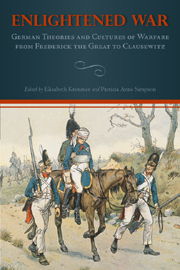Book contents
- Frontmatter
- Contents
- List of Illustrations
- Acknowledgments
- Introduction: Enlightened Warfare in Eighteenth-Century Germany
- Part I War and Enlightenment
- Part II Cultures of War in Classicism and Romanticism
- Part III War and Gender
- Part IV War and Theory
- 10 Just War and Perpetual Peace: Kant on the Legitimate Use of Political Violence
- 11 Military Intelligence: On Carl von Clausewitz's Hermeneutics of Disturbance and Probability
- 12 Host Nations: Carl von Clausewitz and the New U.S. Army/Marine Corps Field Manual, FM 3-24, MCWP 3-33.5, Counterinsurgency
- Bibliography
- Notes on the Contributors
- Index
10 - Just War and Perpetual Peace: Kant on the Legitimate Use of Political Violence
from Part IV - War and Theory
Published online by Cambridge University Press: 05 February 2013
- Frontmatter
- Contents
- List of Illustrations
- Acknowledgments
- Introduction: Enlightened Warfare in Eighteenth-Century Germany
- Part I War and Enlightenment
- Part II Cultures of War in Classicism and Romanticism
- Part III War and Gender
- Part IV War and Theory
- 10 Just War and Perpetual Peace: Kant on the Legitimate Use of Political Violence
- 11 Military Intelligence: On Carl von Clausewitz's Hermeneutics of Disturbance and Probability
- 12 Host Nations: Carl von Clausewitz and the New U.S. Army/Marine Corps Field Manual, FM 3-24, MCWP 3-33.5, Counterinsurgency
- Bibliography
- Notes on the Contributors
- Index
Summary
Assent to War and Perpetual Peace
IMMANUEL KANT'S SEMINAL POLITICAL TEXT on war and peace, “Toward Perpetual Peace,” provides a backdrop for a general discussion about the justifiability of political violence. What at first glance seems to be a categorical rejection of warfare in fact opens the possibility of justifiable wars that go beyond mere self-defense. Kant's defense of human dignity and its protection, I contend, provides the impetus for this line of argument. What follows is an elaboration and explication of this claim, and an argument for a connection between Kant's thinking on the issue of political violence and its relevance for wars in our own time.
Kant's insistence on the illegitimacy of political revolution is well-known. Deference to existing political authority knows no exception in Kant's thinking; for him, the violent overthrow of an authoritarian, even a despotic regime undermines the juridical condition of a state as such, unleashing lawlessness, and must therefore be rejected in favor of a process of slow and gradual reform toward a just, republican state. His dictum “There shall be no war” makes his point abundantly clear both in the context of European wars in the eighteenth century and in the idealist teleology of the development of a non-violent cosmopolitan order in the future. This is not to say that Kant rules out war as a means to achieving justice and order on an international scale, however.
- Type
- Chapter
- Information
- Enlightened WarGerman Theories and Cultures of Warfare from Frederick the Great to Clausewitz, pp. 241 - 257Publisher: Boydell & BrewerPrint publication year: 2011

